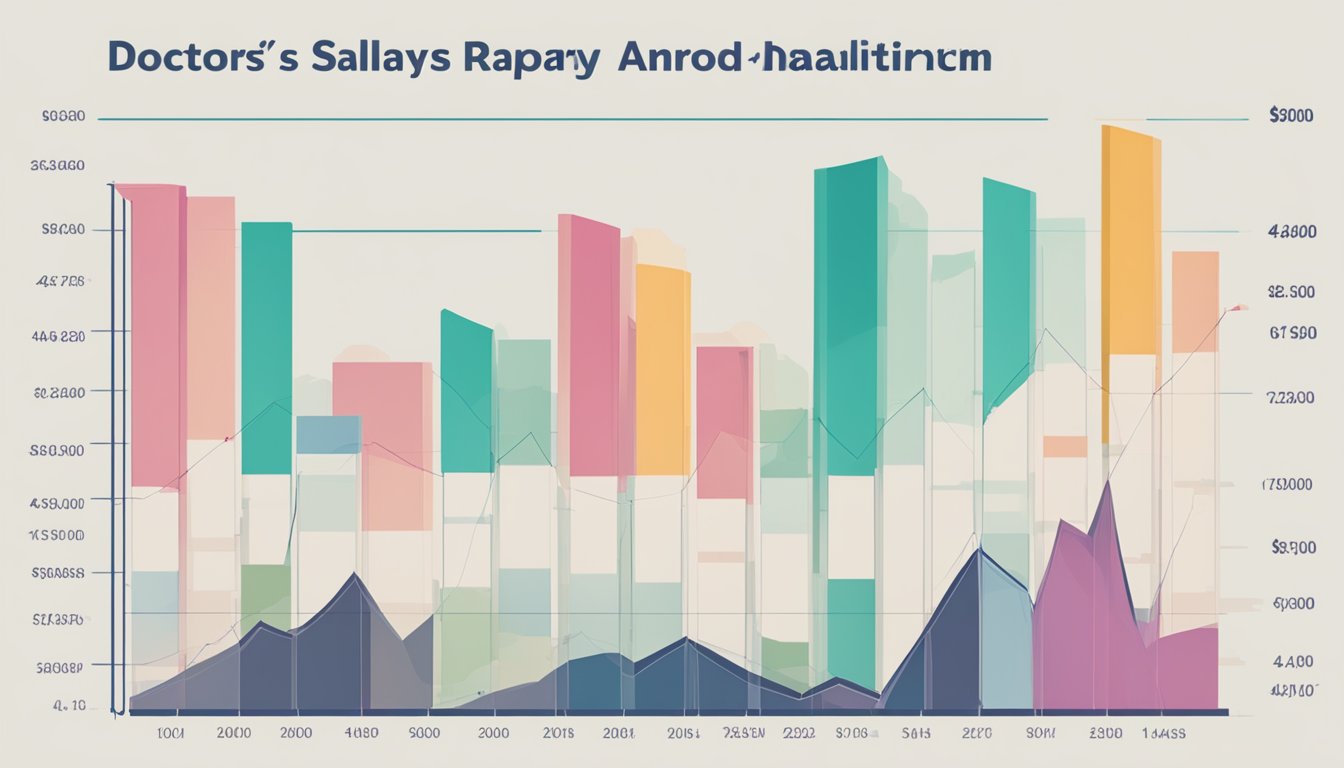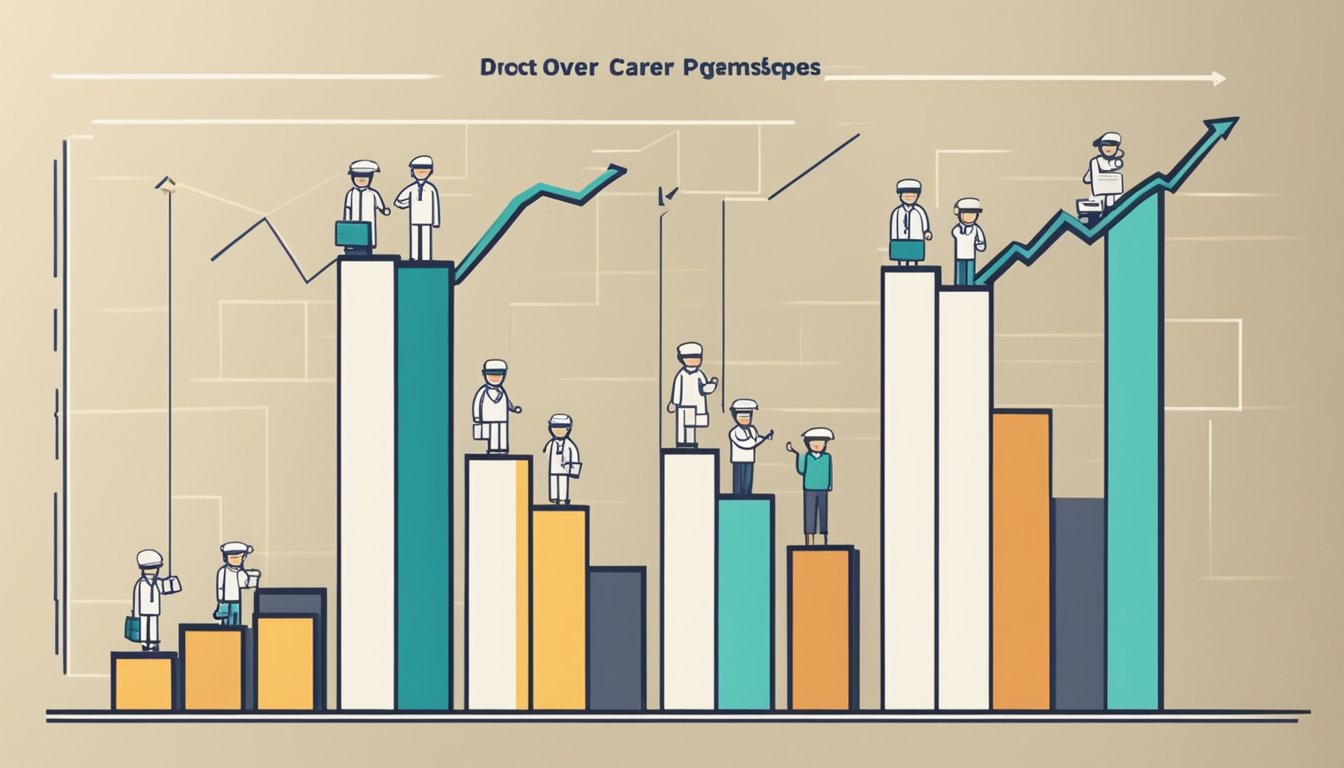Are you curious about how much doctors make in Singapore? As a physician, it’s important to know what to expect in terms of salary. With the cost of living in Singapore being relatively high, it’s important to ensure that your salary is sufficient to cover your expenses and allow you to live comfortably.

Fortunately, doctors in Singapore are generally well-compensated for their work. According to a salary guide by DollarsAndSense.sg, junior doctors can expect to earn a basic monthly salary of between S$3,750 to S$6,500, depending on the hospital or healthcare institution they work for. As doctors gain more experience, their salaries will gradually increase. If you’re a medical doctor, you can expect to earn an average monthly salary of $18,111, according to Glassdoor.
Keep reading to learn more about the factors that can affect a doctor’s salary in Singapore and what you can do to maximise your earning potential.
2 Min Read
Wondering how much doctors make in Singapore? Here’s a quick overview:
- Average salary: $16,550 per month (Glassdoor)
- Salary range: Doctors’ salaries in Singapore can range from $11,000 to $18,111 per month (Jobstreet, Glassdoor). This variation depends on several factors, including a doctor’s experience, area of specialization, and whether they work in the public or private sector.
- Experience: As with many professions, doctors in Singapore see their salaries increase as they gain experience. Junior doctors, or those in their early postgraduate years, can expect to earn a basic monthly salary of S$3,750 to S$6,500 (DollarsAndSense.sg). This salary typically increases significantly as doctors progress through their careers and take on more responsibility.
- Specialization: Certain medical specializations are in higher demand in Singapore and can command higher salaries. For example, specialists like cardiologists or neurosurgeons can expect to earn more than general practitioners. According to DollarsAndSense.sg, specialists can earn anywhere from S$12,000 to S$50,000 per month.
- Public vs private practice: The type of practice a doctor works in can also significantly impact their salary. Doctors who work in public hospitals generally earn a lower salary than those who work in private practice. According to Glassdoor, the average salary for a doctor in Singapore is S$16,550 per month, but this can vary depending on the type of practice.
Overall, doctors in Singapore are well-compensated, and their salaries can increase with experience and specialization.
Overview of the Medical Profession in Singapore

Are you curious about the medical profession in Singapore and how much doctors earn? You’re in the right place! In this section, we’ll provide an overview of the medical profession in Singapore, including the healthcare system structure and the demand for doctors in the country.
Healthcare System Structure
The healthcare system in Singapore is well-developed and efficient, with both public and private healthcare sectors. The public healthcare sector is managed by the Ministry of Health (MOH) and comprises several healthcare clusters, including SingHealth, National Healthcare Group (NHG), and National University Health System (NUHS). The private healthcare sector is made up of private hospitals, medical clinics, and specialist clinics.
SingHealth is the largest public healthcare cluster in Singapore, comprising four public hospitals, five national specialty centres, and a network of primary healthcare clinics. The SingHealth group provides a wide range of medical services, including general surgery, cardiology, neurology, and more.
Demand for Doctors in Singapore
There is a high demand for doctors in Singapore, particularly in the public healthcare sector. According to Jobstreet, the average monthly salary for doctors in Singapore ranges from $11,000 to $13,000. However, the salary can vary depending on the doctor’s level of experience, specialty, and hospital or healthcare institution.
SingHealth is one of the largest healthcare employers in Singapore and offers various career opportunities for doctors. The SingHealth group is committed to providing quality patient care and investing in the development and training of its staff.
Factors Influencing Doctors’ Salaries

If you are considering becoming a physician in Singapore, you may be wondering how much you can expect to earn. The salary of a doctor in Singapore can vary widely depending on many factors, including years of experience, specialisation, and type of practice.
Years of Experience
As with many professions, the more experience you have, the higher your salary is likely to be. According to Jobstreet, junior doctors, or those in their early postgraduate years, may earn a basic monthly salary of S$3,750 to S$6,500. However, as you gain more experience, your salary is likely to increase significantly.
Specialisation
Another important factor that can influence a doctor’s salary in Singapore is their specialisation. Some specialisations, such as cardiology or neurosurgery, are in high demand and can command higher salaries. According to DollarsAndSense.sg, specialists can earn anywhere from S$12,000 to S$50,000 per month.
Type of Practice
The type of practice a doctor works in can also have a significant impact on their salary. Doctors who work in public hospitals may earn a lower salary than those who work in private practice. According to Glassdoor, the average salary for a doctor in Singapore is S$16,550 per month, but this can vary depending on the type of practice.
It’s important to note that these are just a few of the many factors that can influence a doctor’s salary in Singapore. Other factors, such as location, can also play a role. However, by considering these factors, you can get a better idea of what you can expect to earn as a physician in Singapore.
Average Salary Range for Doctors in Singapore

If you’re considering becoming a doctor in Singapore, one of the most important factors to consider is the average salary range. According to Glassdoor, the average salary for doctors in Singapore is around $16,550 per month. However, this figure can vary depending on a number of factors, such as experience, specialty, and location.
Public Sector Wages
Doctors who work in the public sector in Singapore can expect to earn a slightly lower salary than those who work in the private sector. According to Jobstreet, the average monthly salary for doctors in the public sector ranges from $11,000 to $13,000. However, doctors who work in the public sector can benefit from a range of perks, such as job security, pension schemes, and opportunities for advancement.
Private Sector Earnings
On the other hand, doctors who work in the private sector in Singapore can earn significantly more than those who work in the public sector. According to Glassdoor, the average salary for medical doctors in the private sector is around $18,111 per month. In addition to a higher salary, doctors who work in the private sector can also benefit from greater flexibility, better working conditions, and opportunities to work with cutting-edge medical technology.
Salary Comparisons by Medical Specialisations

If you are considering a career as a physician in Singapore, you may be wondering how much you can expect to earn. The answer depends largely on your medical specialisation. Here are some salary comparisons based on different medical specialisations:
General Practitioner
General practitioners in Singapore typically earn an average monthly salary of around SGD 8,000 to SGD 12,000. However, this can vary depending on factors such as experience, location, and the size of the practice.
Surgeon
Surgeons are among the highest-paid medical professionals in Singapore. According to Glassdoor, the average monthly salary for a surgeon in Singapore is around SGD 25,000. However, this can vary depending on factors such as experience, location, and the type of surgery performed.
Cardiologist
Cardiologists are specialists in heart health. According to Jobstreet, the average monthly salary for a cardiologist in Singapore ranges from SGD 15,000 to SGD 25,000. However, this can vary depending on factors such as experience, location, and the size of the practice.
Paediatrician
Paediatricians are specialists in child health. According to DollarsAndSense, the average monthly salary for a paediatrician in Singapore ranges from SGD 8,000 to SGD 12,000. However, this can vary depending on factors such as experience, location, and the size of the practice.
Psychiatrist
Psychiatrists are medical doctors who specialise in mental health. According to Glassdoor, the average monthly salary for a psychiatrist in Singapore is around SGD 20,000. However, this can vary depending on factors such as experience, location, and the size of the practice.
As you can see, the salary of a physician in Singapore varies depending on their specialisation. It is important to consider factors such as experience, location, and the size of the practice when determining your potential salary.
Tip: Maximize Your Earning Potential as a Doctor in Singapore!
Considering a medical career in Singapore? Here’s a hot tip: Specialize! Salaries can jump significantly depending on your chosen field. For example, cardiologists earn an average of $25,000 monthly, while general practitioners make around $12,000. Invest in your education and training to unlock your highest earning potential.
Geographical Variations in Doctors’ Salaries

If you’re a doctor in Singapore, your salary will depend on various factors, including your experience, specialisation, and location. While some doctors enjoy a higher salary than others, the pay scale in Singapore is relatively high compared to other countries.
Urban vs Rural Pay Differences
One factor that affects a doctor’s salary is whether they work in an urban or rural area. Doctors working in urban areas like Orchard or Ang Mo Kio tend to earn more than those in rural areas. This is because the cost of living in urban areas is generally higher, and the demand for healthcare services is also higher.
On the other hand, doctors working in rural areas may have a better work-life balance and enjoy a lower cost of living. However, they may also have to deal with a shortage of resources and limited access to specialised healthcare services.
Salary Trends in Key Regions
Another factor that affects a doctor’s salary is the region they work in. According to a salary guide by DollarsAndSense, doctors working in public hospitals in Singapore can earn a basic monthly salary of S$3,750 to S$6,500 during their early postgraduate years. However, as they gain more experience and specialisation, their salary can increase to S$10,000 or more per month.
In addition, doctors working in private hospitals or clinics may earn a higher salary than those in public hospitals, depending on their experience and specialisation. According to Jobstreet, the average salary of a doctor in Singapore is between $11,000 and $13,000.
Impact of Education and Training on Earnings

Becoming a physician in Singapore requires a significant investment in education and training, but the payoff can be substantial. The amount you can earn as a doctor in Singapore is largely determined by your level of education and training. In this section, we will explore how your undergraduate degree and postgraduate qualifications can impact your earnings.
Undergraduate Degrees
To become a physician in Singapore, you must first obtain an undergraduate degree in medicine. This typically takes five to six years of study at one of Singapore’s three medical schools: the National University of Singapore, the Duke-NUS Medical School, or the Lee Kong Chian School of Medicine. During your undergraduate studies, you will gain a strong foundation in medical theory and practice, as well as hands-on experience through clinical rotations.
Your undergraduate degree is the first step towards becoming a physician, but it is not enough to guarantee a high salary. According to DollarsAndSense.sg, junior doctors in their early postgraduate years can earn a basic monthly salary of S$3,750 to S$6,500, depending on the hospital or healthcare institution. As you gain experience and specialise, your salary will increase gradually.
Postgraduate Qualifications
After completing your undergraduate degree, you will need to obtain postgraduate qualifications to become a fully qualified physician in Singapore. This typically involves completing a residency programme, which can take three to six years depending on your chosen specialisation.
Postgraduate qualifications are essential for advancing your career as a physician and increasing your earning potential. According to Today Online, doctors with postgraduate qualifications can earn significantly more than those without. For example, a specialist in cardiology can earn up to S$30,000 per month, while a general practitioner can earn around S$10,000 per month.
Career Progression and Salary Growth

As a physician, you can expect to see your salary increase as you progress through your career. Here are the different stages of career progression and the corresponding salary growth:
Entry-Level Positions
As a junior doctor in Singapore, you can expect to earn a basic monthly salary of S$3,750 to S$6,500, depending on the hospital or healthcare institution you work for. This salary may increase as you gain more experience and move up the ranks.
Mid-Career Advancements
As you gain more experience and expertise in your field, you may be promoted to a senior doctor position. According to Jobstreet, the average salary of a doctor in Singapore is between $11,000 and $13,000. This salary may vary depending on your specialization and the hospital or healthcare institution you work for.
Senior-Level Compensation
As a senior doctor in Singapore, you can expect to earn a higher salary. According to Glassdoor, the average salary for a doctor in Singapore is $16,550 per month, with additional cash compensation of up to $15,000. This salary may also vary depending on your specialization and the hospital or healthcare institution you work for.
It’s important to note that your salary growth as a physician may also depend on other factors such as your performance, qualifications, and experience. It’s always a good idea to continue learning and improving your skills to increase your chances of career advancement and salary growth.
Benefits and Perks for Doctors in Singapore

As a doctor in Singapore, you can expect to receive a range of benefits and perks in addition to your salary. These may vary depending on the hospital or healthcare institution you work for, but here are some of the most common benefits and perks that doctors in Singapore receive:
1. Medical Benefits
One of the biggest perks of being a doctor in Singapore is that you and your immediate family members are entitled to free medical treatment at any public hospital or polyclinic in the country. This means that you won’t have to worry about paying for medical bills if you or your family members fall ill.
2. Annual Leave
Doctors in Singapore are entitled to at least 14 days of annual leave per year, which can be increased depending on your years of service. This allows you to take a break from work and spend time with your loved ones or pursue your hobbies and interests.
3. Continuing Medical Education (CME)
To maintain your medical license in Singapore, you are required to complete a certain number of CME hours each year. Fortunately, many hospitals and healthcare institutions in Singapore provide their doctors with opportunities to attend conferences, workshops, and courses to fulfill their CME requirements. This not only helps you stay up-to-date with the latest medical developments but also allows you to network with other healthcare professionals.
4. Professional Indemnity Insurance
As a doctor in Singapore, you are required to have professional indemnity insurance to protect yourself against any claims of medical malpractice. Many hospitals and healthcare institutions provide their doctors with this insurance as part of their employment package.
5. Flexible Working Arrangements
Many hospitals and healthcare institutions in Singapore offer their doctors flexible working arrangements, such as part-time or job-sharing options. This allows you to balance your work with your personal life and take care of your family or pursue other interests.
Overall, being a doctor in Singapore comes with a range of benefits and perks that make it a rewarding and fulfilling career. From free medical treatment to flexible working arrangements, you can expect to be well taken care of by your employer.
Frequently Asked Questions
What is the monthly income for a doctor practising in Singapore?
If you are a doctor practising in Singapore, you can expect to earn a monthly income of around SGD 16,000. This figure is based on the average salary for a doctor in Singapore, according to Glassdoor. However, the actual amount you earn may vary depending on factors such as your level of experience, your speciality, and whether you work in the public or private sector.
What are the earnings for a government-employed doctor in Singapore?
If you are a government-employed doctor in Singapore, your earnings will be determined by your rank and years of service. According to Salary.sg, a medical officer with less than 4 years of experience can expect to earn a basic salary of around SGD 4,800 per month, while a senior consultant with more than 15 years of experience can earn up to SGD 40,000 per month.
Who are the top-earning doctors in Singapore, and what are their specialities?
The top-earning doctors in Singapore are typically those who specialise in fields such as cardiology, neurology, and oncology. According to The Straits Times, specialist doctors in Singapore earn an average of SGD 1 million per year, with some earning up to SGD 3 million per year.
What salary can a junior doctor anticipate in Singapore?
If you are a junior doctor in Singapore, your salary will depend on your level of experience and the nature of your work. According to DollarsAndSense, junior doctors can expect to earn a basic monthly salary of between SGD 3,750 and SGD 6,500 during their early postgraduate years.
How lucrative is the career of a polyclinic doctor in Singapore?
Polyclinic doctors in Singapore typically earn less than their counterparts in private practice or the public sector. According to JobStreet, the average monthly salary for a doctor working in a polyclinic in Singapore ranges from SGD 11,000 to SGD 13,000.
During their residency, how much can doctors expect to earn in Singapore?
During their residency, doctors in Singapore can expect to earn a basic monthly salary of around SGD 4,000 to SGD 5,000, according to Salary.sg. However, this figure may vary depending on factors such as your level of experience and the nature of your work.
Applying for Loans Just Got Easier with Quick Credit
Do rising costs leave you feeling strapped? Unexpected expenses can disrupt even the most careful budget.
Quick Credit offers a simpler solution. Our streamlined online application lets you apply for a personal loan in minutes. No more complicated paperwork or lengthy wait times.
Take control of your finances today. A Quick Credit loan can help you bridge the gap and achieve financial peace of mind.
Click here to get started.
